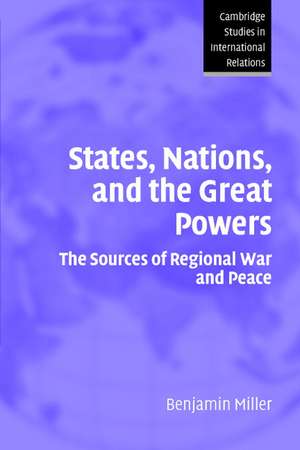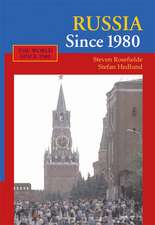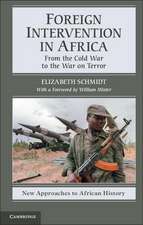States, Nations, and the Great Powers: The Sources of Regional War and Peace: Cambridge Studies in International Relations, cartea 104
Autor Benjamin Milleren Limba Engleză Paperback – 29 aug 2007
| Toate formatele și edițiile | Preț | Express |
|---|---|---|
| Paperback (1) | 392.52 lei 6-8 săpt. | |
| Cambridge University Press – 29 aug 2007 | 392.52 lei 6-8 săpt. | |
| Hardback (1) | 1079.30 lei 6-8 săpt. | |
| Cambridge University Press – 29 aug 2007 | 1079.30 lei 6-8 săpt. |
Din seria Cambridge Studies in International Relations
-
 Preț: 200.78 lei
Preț: 200.78 lei -
 Preț: 190.01 lei
Preț: 190.01 lei -
 Preț: 198.89 lei
Preț: 198.89 lei -
 Preț: 210.69 lei
Preț: 210.69 lei -
 Preț: 200.85 lei
Preț: 200.85 lei -
 Preț: 232.37 lei
Preț: 232.37 lei -
 Preț: 237.58 lei
Preț: 237.58 lei - 8%
 Preț: 401.23 lei
Preț: 401.23 lei -
 Preț: 229.56 lei
Preț: 229.56 lei -
 Preț: 265.70 lei
Preț: 265.70 lei -
 Preț: 200.08 lei
Preț: 200.08 lei -
 Preț: 207.81 lei
Preț: 207.81 lei -
 Preț: 158.77 lei
Preț: 158.77 lei -
 Preț: 162.49 lei
Preț: 162.49 lei -
 Preț: 231.47 lei
Preț: 231.47 lei - 11%
 Preț: 584.77 lei
Preț: 584.77 lei -
 Preț: 241.77 lei
Preț: 241.77 lei -
 Preț: 287.87 lei
Preț: 287.87 lei -
 Preț: 209.12 lei
Preț: 209.12 lei -
 Preț: 299.22 lei
Preț: 299.22 lei -
 Preț: 286.13 lei
Preț: 286.13 lei -
 Preț: 287.87 lei
Preț: 287.87 lei - 11%
 Preț: 641.67 lei
Preț: 641.67 lei - 11%
 Preț: 585.78 lei
Preț: 585.78 lei - 14%
 Preț: 843.23 lei
Preț: 843.23 lei -
 Preț: 303.80 lei
Preț: 303.80 lei -
 Preț: 284.78 lei
Preț: 284.78 lei -
 Preț: 279.76 lei
Preț: 279.76 lei -
 Preț: 285.75 lei
Preț: 285.75 lei -
 Preț: 324.24 lei
Preț: 324.24 lei -
 Preț: 290.16 lei
Preț: 290.16 lei -
 Preț: 291.69 lei
Preț: 291.69 lei -
 Preț: 315.99 lei
Preț: 315.99 lei
Preț: 392.52 lei
Nou
Puncte Express: 589
Preț estimativ în valută:
75.11€ • 78.62$ • 62.51£
75.11€ • 78.62$ • 62.51£
Carte tipărită la comandă
Livrare economică 31 martie-14 aprilie
Preluare comenzi: 021 569.72.76
Specificații
ISBN-13: 9780521691611
ISBN-10: 0521691613
Pagini: 526
Ilustrații: 8 b/w illus. 22 tables
Dimensiuni: 150 x 229 x 33 mm
Greutate: 0.7 kg
Editura: Cambridge University Press
Colecția Cambridge University Press
Seria Cambridge Studies in International Relations
Locul publicării:Cambridge, United Kingdom
ISBN-10: 0521691613
Pagini: 526
Ilustrații: 8 b/w illus. 22 tables
Dimensiuni: 150 x 229 x 33 mm
Greutate: 0.7 kg
Editura: Cambridge University Press
Colecția Cambridge University Press
Seria Cambridge Studies in International Relations
Locul publicării:Cambridge, United Kingdom
Cuprins
1. Why some regions are peaceful and others are not; 2. A theory of regional war and peace; 3. States, nations and war; 4. Explaining the war-proneness of the Middle East in a comparative perspective; 5. The great powers and war and peace in the Middle East; 6. War and peace in the Balkans: states, nations and great powers; 7. The state-to-nation balance and the emergence of peace in South America during the twentieth century; 8. The emergence of high-level peace in post-1945 Western Europe: Nationalism, democracy, hegemony and regional integration; 9. Conclusions.
Recenzii
'Benjamin Miller's States, Nations and the Great Powers is a superb book. It advances the important thesis that to understand the prospects for peace or war in a given region, we need to examine the interaction between the political conditions that obtain within the region and the actions of great powers from outside the region. Miller's book is masterful in its integration of international relations theory and the comparative method. It will be of interest to a wide range of readers, from undergraduates and graduate students to scholars, and from policy-makers to journalists to citizens, indeed to anyone who is interested in peace and security in the modern era.' Joseph M. Grieco, Duke University
'This substantial and intricate book embeds a traditional realist analysis of war and peace in a novel regional framework highlighting variations in the revisionist orientation and political incoherence of regional states. The Middle East and the Balkans, as well as Latin America and Western Europe, provide the empirical material for this careful and challenging argument. Miller adds important new insights to the analysis of regions in world politics.' Peter J. Katzenstein, Cornell University
'States, Nations and the Great Powers is an ambitious and original work of scholarship, which seeks to explain regional war and peace by focusing on whether regional political boundaries reflect national aspirations. Miller argues convincingly that both the impact of external great powers and the relevance of realist and liberal theory are conditional on this 'state to nation balance.'' Robert O. Keohane, Princeton University
'The striking variation in the propensity toward war and peace in the different regions of the world is enormously important for our understanding of international conflict but neglected by most conflict analysts. By focusing on the degree of congruence between the territorial boundaries of states and the less formal boundaries of peoples, Miller provides a powerful explanation for this intriguing puzzle.' Jack S. Levy, Rutgers University
'A rich and rewarding study of the causes and cures of regional conflicts.' Ken Waltz, Columbia University in the City of New York
'Benjamin Miller has written an ambitious book explaining why some regions of the world are more peaceful than others. His claim that it is due to a combination of factors relating to nationalism and great-power competition is innovative as well as compelling. This important book will be widely read and widely cited.' John J. Mearsheimer, University of Chicago
'Debates about the causes of war have tended to focus on conflict among the great powers and the global balance of power. This important study asserts that the real puzzles of war and peace exist on a lesser scale within regions. … Although highly theoretical, the book is full of useful insights about potential pathways toward regional peacemaking, particularly in regard to the Middle East.' Foreign Affairs
'This substantial and intricate book embeds a traditional realist analysis of war and peace in a novel regional framework highlighting variations in the revisionist orientation and political incoherence of regional states. The Middle East and the Balkans, as well as Latin America and Western Europe, provide the empirical material for this careful and challenging argument. Miller adds important new insights to the analysis of regions in world politics.' Peter J. Katzenstein, Cornell University
'States, Nations and the Great Powers is an ambitious and original work of scholarship, which seeks to explain regional war and peace by focusing on whether regional political boundaries reflect national aspirations. Miller argues convincingly that both the impact of external great powers and the relevance of realist and liberal theory are conditional on this 'state to nation balance.'' Robert O. Keohane, Princeton University
'The striking variation in the propensity toward war and peace in the different regions of the world is enormously important for our understanding of international conflict but neglected by most conflict analysts. By focusing on the degree of congruence between the territorial boundaries of states and the less formal boundaries of peoples, Miller provides a powerful explanation for this intriguing puzzle.' Jack S. Levy, Rutgers University
'A rich and rewarding study of the causes and cures of regional conflicts.' Ken Waltz, Columbia University in the City of New York
'Benjamin Miller has written an ambitious book explaining why some regions of the world are more peaceful than others. His claim that it is due to a combination of factors relating to nationalism and great-power competition is innovative as well as compelling. This important book will be widely read and widely cited.' John J. Mearsheimer, University of Chicago
'Debates about the causes of war have tended to focus on conflict among the great powers and the global balance of power. This important study asserts that the real puzzles of war and peace exist on a lesser scale within regions. … Although highly theoretical, the book is full of useful insights about potential pathways toward regional peacemaking, particularly in regard to the Middle East.' Foreign Affairs
Notă biografică
Descriere
This book offers a novel theory of war and peace developed through an analysis of regional conflict.

















